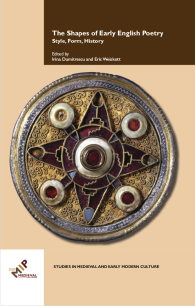With Irina Dumitrescu, I edited The Shapes of Early English Poetry: Style, Form, History (Medieval Institute Publications, 2019), number 51 in the series Studies in Medieval and Early Modern Culture. The book is in honor of the retirement of our Yale University PhD adviser, Roberta Frank.

A methodological sponsor of the project is Yale art historian George Kubler, whose 1962 book The Shape of Time argues that serial artistic production shapes time, or in other words that there exist properly aesthetic-historical temporal dimensions of human experience. Kubler expresses the idea that the history of art, and by extension other cultural fields, is composed of many simultaneous, unsynchronized histories.
from the back cover:
This volume contributes to the study of early English poetics. In these essays, several related approaches and fields of study radiate outward from poetics, including stylistics, literary history, word studies, gender studies, metrics, and textual criticism. By combining and redirecting these traditional scholarly methods, as well as exploring newer ones such as object-oriented ontology and sound studies, these essays demonstrate how poetry responds to its intellectual, literary, and material contexts.
The contributors propose to connect the small (syllables, words, and phrases) to the large (histories, emotions, faiths, secrets). In doing so, they attempt to work magic on the texts they consider: turning an ordinary word into something strange and new, or demonstrating texture, difference, and horizontality where previous eyes had perceived only smoothness, sameness, and verticality.
contents
Roberta Frank’s publications, 1970-present
Irina Dumitrescu and Eric Weiskott, “Introduction”
Part 1. Seasons
Mary Kate Hurley, “Weathering Time in the Wanderer“
Andrew James Johnston, “Beowulf as Anti-Virgilian World Literature: Archaeology, Ekphrasis, and Epic”
Denis Ferhatović, “A Portrait of the Translator as Grendel’s Mother: The Postcolonial Feminist Polyphony of Meghan Purvis’s Beowulf“
Part 2. Engines
Emily V. Thornbury, “Light Verse in Anglo-Saxon England”
Eric Weiskott, “The Paris Psalter and English Literary History”
Sarah Elliott Novacich, “Generative Form”
Christopher Abram, “Kennings and Things: Towards an Object-Oriented Skaldic Poetics”
Part 3. Discordance
A. B. Kraebel, “Lydgate’s Missing ‘Ballade’ and the Bibliographical Imaginary”
Irina Dumitrescu, “Spoiled and Eaten: Figures of Absorption in Medieval English Poetry”
Jordan Zweck, “‘Gehyre se ðe wille’: Sonic Worlds in Old Testament Poetry”
endorsements
“Scholars and students will find this collection generates poetic possibility and informs in equal measure.” —Carl Kears in Speculum
“These essays skillfully interweave poetic, linguistic, and historical considerations. […] The volume fittingly commemorates Roberta Frank’s abundant and far-reaching contributions to the study of medieval literature and history.” —Evelyn Reynolds in The Medieval Review
“Consistently astute and innovative […]. […] What makes this collection particularly exciting are the openings and overviews of many new kinds of formalist and materialist poetics that are given new theorizations and applications, linked by discernible though not always directly retraceable paths to Frank’s inimitably deft and witty studies.” —Andrew Galloway, editor of Answerable Style: The Idea of the Literary in Medieval England
“A robust study of early English aesthetics. The contributors engage this challenging topic with verve and relevance, ever attentive to the social and historical implications of style.” —Stacy S. Klein in Anglia
“Two chapters [Thornbury and Weiskott] stand out and will undoubtedly be frequently cited in the future, because they have important implications for understanding of the Old English poetic tradition as a whole. [Deux art. sortent […] du lot et seront sans nul doute fréquemment cités à l’avenir, tant leurs implications sont importantes pour la compréhension de la tradition poétique vieil-anglaise dans son ensemble.]” —Élise Louviot in Le Moyen Âge
“As a whole, the book accomplishes a lot: It combines precise textual analysis with new perspectives and thereby not only celebrates Roberta Frank’s life’s work, but successfully paves the way into the twenty-first century for the impulses guiding her research [Als Gesamtwerk aber leistet der Band vieles: Er verbindet präzise Textanalyse mit neuen Perspektiven und feiert damit nicht nur Roberta Franks Lebenswerk, sondern ebnet ihren Forschungsimpulsen erfolgreich den Weg ins 21. Jahrhundert].” —Nicole Nyffenegger in Das Mittelalter
reviews
Carl Kears, Speculum 99 (2024): 208-209
Evelyn Reynolds, The Medieval Review 5 March 2021
Andrew Galloway, Modern Philology 118 (2020): E8-11
Stacy S. Klein, Anglia 138 (2020): 540-44
Élise Louviot, Le Moyen Âge 126 (2020): 187-88 [French]
Nicole Nyffenegger, Das Mittelalter 25 (2020): 212-13 [German]
word cloud
